The fast track to growth



Faced with the twin challenges of rising costs and ToBRFV, we look at how the tomato business can adapt and thrive

MARKETS
NETHERLANDS
THE ANNUAL PUBLICATION FROM FRUITNET MEDIA INTERNATIONAL
BELGIUM UK SPAIN MOROCCO ISRAEL TECHNOLOGY
They are alluring in appearance and a pleasure to bite into, to cook with or even to eat whole as a snack. Quite simply, at Looye we are proud of our tomatoes.


































































Looye Kwekers | Vlietboomgaard 10 | 2672 JA | Naaldwijk | NL +31(0)174 524 250 | sales@looye.com At Looye, taste has been at the heart of our family business for more
75 years. Here lies the essence for how we grow our Looye JOYN tomatoes and
Honeytomatoes.
than
Looye
Taste for tomorrow doc.indd 1 19/04/2023 15:31
Advertisers

Veg shortages offer some perspective
Ihave a friend called Harvey. He is a man who enjoys many things, such as playing cricket, watching Formula One, and creating some of the best homemade cider you could ever hope to taste. But one of the things Harvey really loves is a sweet, juicy, crisp tomato, particularly when indulging in that most English of traditions, a cricket tea. So it was he that immediately sprang to mind when a salad vegetable shortage hit the UK in late February and early March of 2023. The images of retailers’ bare shelves, and hastily printed A4 signs declaring that some products would be rationed, made headline news across this country and far beyond. While the causes of the shortages have been well documented, the desolate displays offered a timely reminder of the fragility and uncertainty of the agricultural business. The hard work of those throughout the supply chain often goes overlooked. So let us take a step back to acknowledge the efforts of everyone across the fresh produce business, including those featured in Fresh Focus Tomato. From the research and development teams that work on the latest disease-resistant traits, to the growers who manage yields and tend to crops, and the packaging companies that offer more sustainable solutions, which will do that little bit extra for the planet. All with the ultimate aim of yes, making money, but also providing that moment of tasty pleasure for the consumer. And with Harvey’s wedding coming up, and tomatoes a dead cert for the menu, I think he for one will be very grateful indeed.
01 fresh focus tomato
Contents Trade data 2 Keynote interview: Margriet Looij 4-6 Netherlands 8-16 Belgium 18-20 UK 22-24 Spain 26-27 Morocco 28 Israel 30 Robotics 32-34 Technology 36-37 Packaging 38 Breeding 40 Carl Collen, Editor Follow me on Twitter: @carlfruitnet
While the causes of the UK shortages are well documented, the empty shelves were a reminder of the fine margins within which the fresh produce business works
AFL 2023 23 Belorta 21 Delassus BC Enza Zaden 13 FL 2024 9 Fruitnet events 35 Gautier Seeds 14 GreenTech 31 Hazera 11 Hoogstraten 19 Looye Kwekers IFC Maf Roda 33 Prominent 15 RedStar 3 Rijk Zwaan 7 Semillas Fitó 27 Sofrupak 39 Subscribe to FPJ IBC Unitec 25 Vlam 16-17 WayBeyond 37 Yuksel Seeds 29 ©2023 Fruitnet Media International Ltd Full contact details at Fruitnet.com Published: May 2023 p.1 Leader.indd 1 21/04/2023 12:58
Tomatoes remain big business
Growth in volume and value of globally traded fresh and chilled tomatoes shows the appetite remains for the salad staple.
by Carl Collen @carlfruitnet
Worldwide imports of fresh and chilled tomatoes grew in both value and volume terms in 2021, with the US and Germany leading the way. According to the International Trade Centre’s (ITC) Trade Map, global imports came to just over US$10.5bn in that year
– the most recent year data had been collected – an increase of 6 per cent year-on-year and 3 per cent on the five-year average. Imported tomato volumes for the year came in at more than 8m tonnes, 2 per cent higher than the five-year average.

The US remained by some distance the largest importer in 2021, bringing in 1.94m tonnes (up 2 per cent year-on-year) at a value of US$2.9bn (up 7 per cent on the five-year average). The country’s share in
ABOVE— Worldwide imports totalled US$10.5bn in 2021
LEFT—Germany is the secondlargest importer of tomatoes a er the US
world imports stood at 27.7 per cent, according to ITC.
Germany was the second-largest importer in value terms, spending US$1.7bn on fresh or chilled tomatoes, 11 per cent more than in 2020. France’s value spend climbed even higher in percentage terms, up 14 per cent on the previous year to US$820m. The UK (US$622m) and Russia (US$482m) rounded out the top five in import value, although they both saw year-ondecreases of 2 per cent and 8 per cent respectively.

Looking at import volume, Germany (756,000 tonnes), France (516,000 tonnes) and Russia (427,000 tonnes) sat behind the US. They were followed by Pakistan, which imported 404,000 tonnes in 2021, a leap of 59 per cent on the fiveyear average, and Iraq with 350,000 tonnes.
MEXICO’S EXPORT EXCELLENCE
When it came to fresh or chilled tomato exports in 2021, the ITC Trade Map showed a clear leader in value and volume. Mexico sent some US$2.54bn of tomatoes to export markets that year, down 2 per cent on 2020 but 7 per cent higher than the five-year average. The country’s export volume stood at a fairly stable 1.9m tonnes, and it was responsible for nearly a quarter of the world’s tomato exports with a 23.1 per cent share.
With a 19.1 per cent share of exports the Netherlands came in second behind Mexico with volumes of 949,000 tonnes, down 3 per cent on the five-year-average, at a value of US$1.7bn, yearly growth of 10 per cent.
Other top exporters included Spain (US$1.15bn), Morocco (US$855m), France (US$511m), Canada (US$473m) and China (US$436m), all of whom saw export value climb between 2020 and 2021. Indeed, China’s value jumped 59 per cent year-on-year and 18 per cent on its five-year average.
02 fresh focus tomato TRADE
p.2.indd 2 21/04/2023 09:48

doc.indd 1 21/04/2023 12:06
Looye Kwekers remains on the right road
Despite some major challenges for the European tomato business during the past few months, the Dutch supplier’s recent investment in premium varieties and more efficient production techniques has handed it some significant advantages.
by Mike Knowles @mikefruitnet
Dutch company Looye Kwekers continues to set a high bar when it comes to the production and marketing of tomatoes.
Founded in 1946, the familyowned business has grown into one of the most innovative and successful tomato growers in Europe. With production in the Netherlands and Spain, it specialises in the production of
premium-quality vine varieties.
A key part of its success has been the development of its own proprietary tomatoes –notably Looye Joyn and Looye Honeytomatoes – that are known for their intense flavour, firm texture, and extended shelf-life.
And with a focus on sustainable and responsible farming practices, Looye Kwekers is committed to producing those
varieties with minimal impact on the environment. That is something which requires innovation, and this means significant investment in R&D to improve products and processes.
To that end, the company was one of the first tomato growers in Europe to introduce LED lighting in its greenhouses. This has reportedly led to significant energy savings and improved crop yields.
Today, Looye Kwekers supplies its premium tomatoes to supermarkets and wholesalers throughout Europe, as well as exporting to countries around the world. Its commitment to quality,

04 fresh focus tomato
KEYNOTE INTERVIEW
p.4-6.indd 4 21/04/2023 09:50
sustainability, and innovation has earned it a loyal customer base and numerous awards for its products.
As Fruitnet prepares to hold its annual Global Tomato Congress in Rotterdam, Fresh Focus Tomato speaks to Margriet Looije, commercial director at Looye Kwekers, about the road ahead for the company and for the tomato category as a whole.

Margriet, thank you for taking the time to speak to us. After a winter during which a lot of production in northern Europe was cancelled, what kind of commercial outlook do you see for the industry in the rest of 2023?
Margriet Looije: In the Netherlands, we see that the revenue for tomatoes grows compared to last year. On the other hand, we also see less volume. The increase in revenue is caused by the higher prices. There is much going on in the
LEFT—Margriet Looije is Looye Kwekers’ commercial director BELOW—The group’s Joyn and Honing varieties form a key part of its premium product range OPPOSITE—New technologies have enabled Looye Kwekers to sustain production through the winter
tomato world:
virus, labour costs, energy, and less winter production from the Netherlands. These challenges affect the situation on the markets. During the summer of 2023, we will learn to which extent these challenges have an influence on prices and
demand. Especially because it looks like consumer behaviour is different compared with the previous two years during the Covid pandemic.
Did your own company continue to produce tomatoes through the winter months in late 2022 and early 2023? If so, why were you able to do this?
ML : Last winter, we continued to produce tomatoes. Our branding strategy requires that we are available on the shelf for 12 months of the year. Therefore,
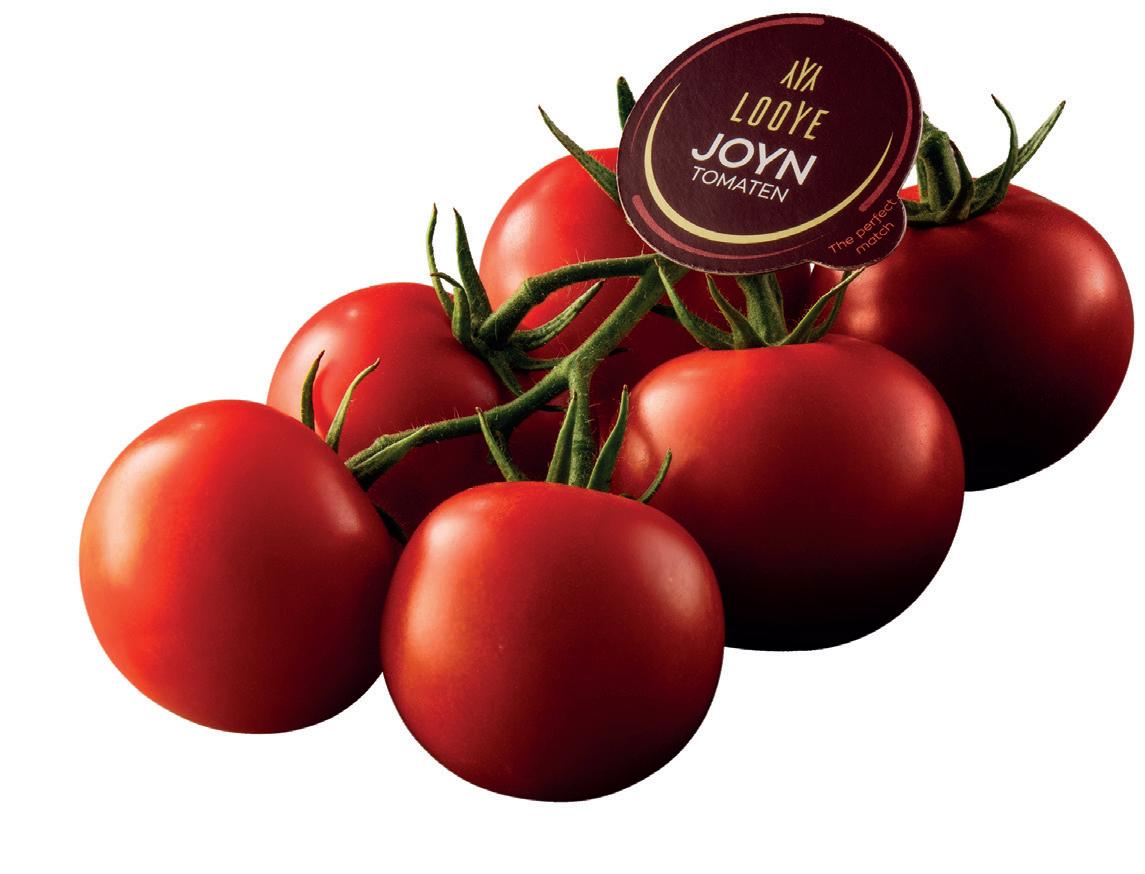

05 fresh focus tomato KEYNOTE INTERVIEW »
p.4-6.indd 5 21/04/2023 09:50
for us it was a no brainer to continue. At this moment, we cannot mention a brand which is only available nine months per year.
Right now, in which specific markets or sales channels do you see good potential for growth?
ML: The wholesale channel remains very important to us. The sales in this channel are stable on a weekly basis. However, we do also see that this channel is struggling with challenges like the recession, inflation, and high electricity prices.
What plans do you have in the next year to promote your products and boost demand?
ML: There are three main areas where we plan to promote our tomatoes. Firstly, we work closely with an extended sales team in the Netherlands, Belgium, and Germany. This extended sales team visits retail customers and the wholesale trade to promote

our products. We invest in pointof-sale materials to promote our products and to boost sales.
Secondly, we invest marketing budget in order to increase our brand awareness. We run campaigns on social media, out of home, in retail media, on radio, and on television.
Last but not least, we run a lot of samplings. We offer samples during big events in different places in the three countries just mentioned. Everything we do is based on investigations. We also invest to collect knowledge about consumers and consumer behaviour.
What steps is Looye Kwekers taking to reduce its environmental impact and promote sustainability?
ML: For more than a year, we have employed a sustainability manager, whose work is fully dedicated to this topic. This not only consists of
environmental impact, but also to make the world a better place. Additionally, we have invested in hybrid LEDs. In fact, this was also one of the reasons why we were able to continue our winter production. We work closely with retailers, we listen to them, and we support them in terms of their sustainability challenges. Additionally, we use as few chemicals as possible. This topic is really high on the agenda in the greenhouses.
In general, what is your vision for the future of Looye Kwekers?
ML: We are very ambitious! Our aim is to enable people to enjoy tasty tomatoes together, across all generations. We believe that we can do that, thanks to a cooperation between people and nature. And we aim to do that every day, in a smarter, more sustainable, and better way. We are a real family business. With two of my three siblings, we run our companies in Spain and the Netherlands. So we are looking forward to the future!
06 fresh focus tomato
KEYNOTE INTERVIEW
“We have invested in hybrid LEDs, which was one of the reasons we were able to continue our winter production”
p.4-6.indd 6 21/04/2023 09:50
ABOVE—Special packaging formats help underline the company’s premium offer
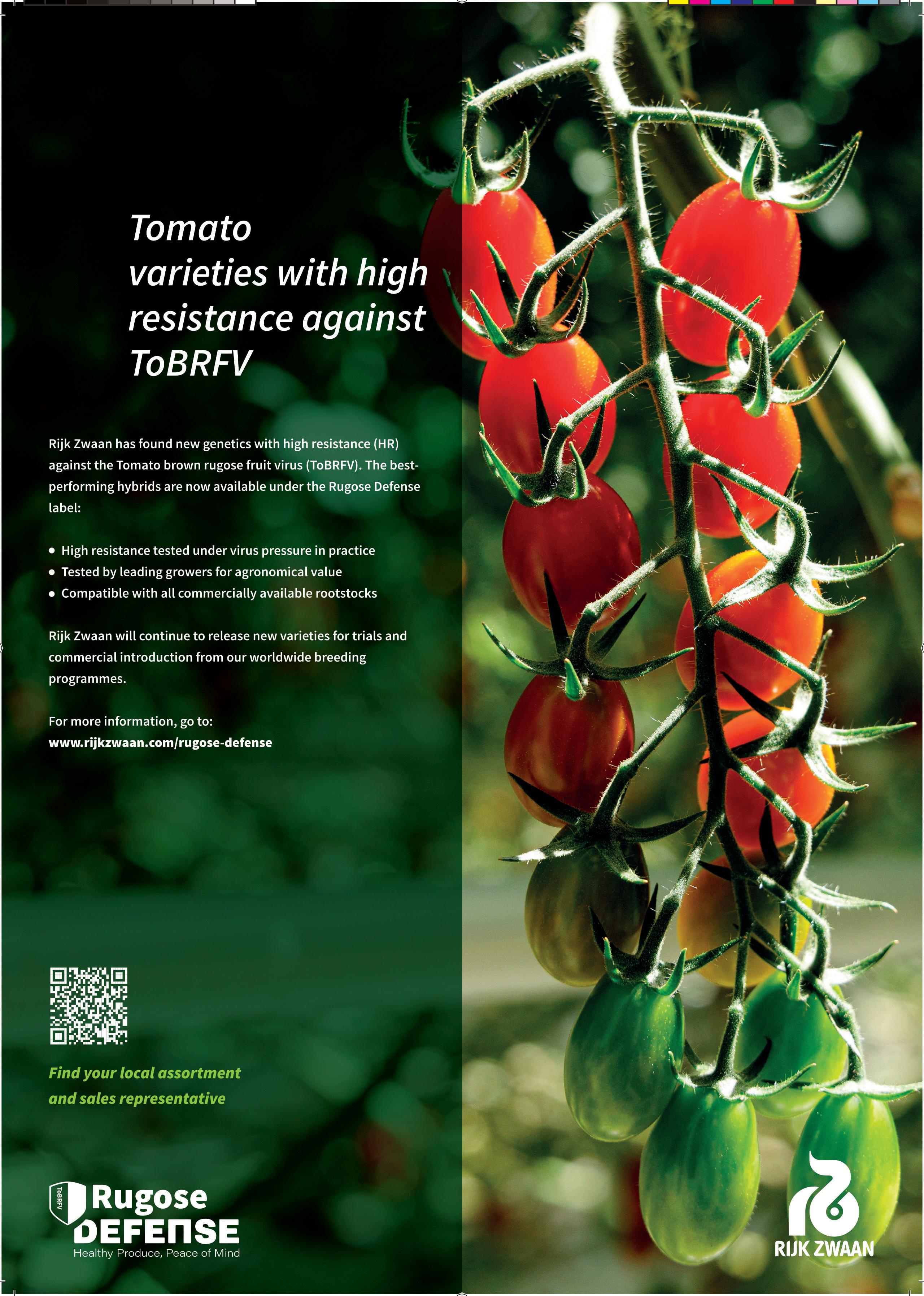
doc.indd 1 18/04/2023 16:12
BASF focuses on ToBRFV resistance
Some 25 new seed varieties are at pre-commercial phase with the aim of becoming available in 2023.
by Carl Collen @carlfruitnet
BASF has said that new tomato varieties resistant to Tomato Brown Rugose Fruit Virus (ToBRFV) are being tested with the aim of becoming commercial in 2023.

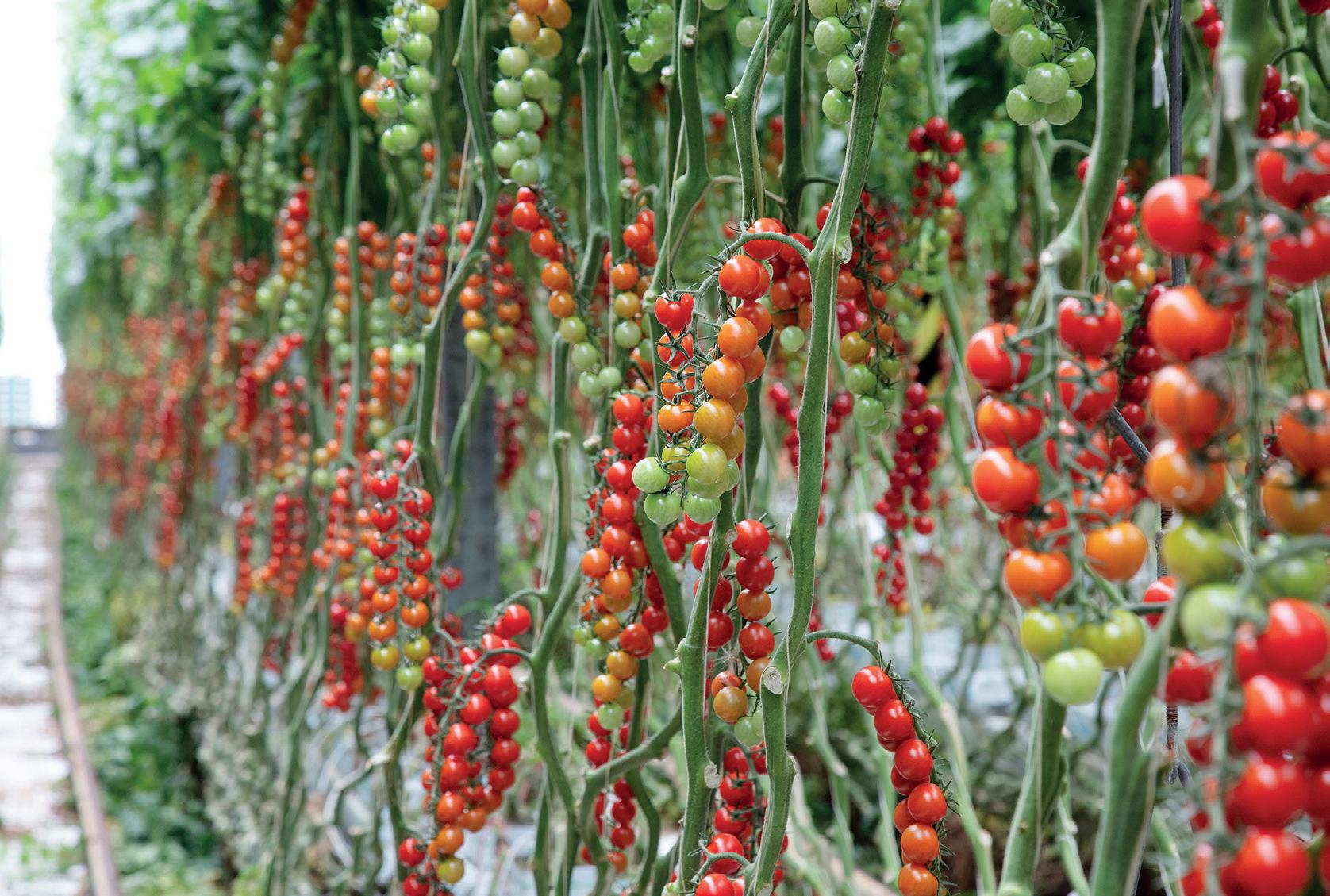
From the early start of the ToBRFV outbreak, BASF said that it had actively sought and offered solutions to growers in ba ling the virus. The group said that the Nunhems portfolio offered a range of resistant tomato seed varieties meeting the requirements of the different levels of the agri-food value chain.
“In 2020, we launched our first ToBRFV resistant tomato variety Teenon F1 in Mexico,” said Maria Muschitiello, product development coordinator of tomato fresh at BASF’s vegetable seeds business.
“A year later, we introduced four more varieties Blindon, Brovian, Strongton and Azovian, all salade e types with good resistance to Rugose and great
adaptability to different hot spots including Spain, Turkey and Morocco.
”At present, we have a commercial assortment with Vitalion, cherry round with high taste adapted to high tech growing in the Netherlands as well as for growing in Canada,” Muschitiello added. ”BASF will
Nasir Ahmed, the UK consumer and customer manager of BASF’s vegetable seeds division, said a new round tomato variety with intermediate resistance to ToBRFV could be “really interesting for growers” since round tomatoes are enjoying higher demand than other types at the moment.
“With the cost of living crisis, six-packs of round tomatoes are the biggest seller at UK retailers, and we’re working hard on a new round variety with Rugose resistance,” he said. “At the moment it doesn’t have a name – it’s just a number – but we want to fasttrack it as we think it’s what the market needs right now.”
continue to introduce new varieties for different types of segments that can be cultivated in many countries.”
ToBRFV was detected for the first time in Jordan in 2014 and, since then, it has spread to many of the main tomato production areas worldwide. In some countries ToBRFV is now endemic, although there are still countries where it is not present, such as in Australia and Brazil.
“With the resistance, we contribute to the continuity of the crop and the production of commercial fruits. And this is precisely what we have successfully achieved,” said Geert Janssen, R&D crop lead Solanaceae.
ABOVE & LEFT—Vitalion is a cherry tomato variety adapted to high-tech growing in the Netherlands and Canada
08 fresh focus tomato NETHERLANDS
The Nunhems portfolio offers a range of resistant tomato seed varieties meeting different value chain requirements
p.8.indd 8 21/04/2023 09:51

doc.indd 1 17/01/2023 14:12
Hazera future-proofs its portfolio
Difficult market conditions have not diminished Hazera’s drive to develop diseaseresistant tomatoes that offer excellent taste and long shelf-life.
by Carl Collen @carlfruitnet
There is undoubted uncertainty for many tomato growers right now. The dual threat of high production costs and ToBRFV create a potentially murky market outlook, where prices rise for consumers and profitability is reduced.

Alejandro Szechtman, marketing director for tomatoes at Hazera, confirms that seed production costs have increased. He says this presents a major

Thireos, Giubilo, Windsor and Pendragon, offering the optimal balance between protection and performance to our customers worldwide.”
Canelo, a salade e type, Thireos, a beef type, and Giubilo, a cherry cluster type, are described as very high-yielding varieties with excellent fruit quality and ToBRFV resistance. Pendragon and Windsor, meanwhile, are new mini-plum or grape type varieties that, on top of their high yield, high brix and ToBRFV resistance, offer a long shelf-life. This offers growers “huge flexibility” in crop management and harvest, and produces much less waste across the whole chain, Szechtman explains.
“We are also happy that we are working towards meeting consumer demand for goodlooking, sweet/high brix tomatoes that maintain their properties
who place more importance not only on taste but also durability.”
Hazera continues to invest heavily in R&D in order to develop new products that provide solutions for its customers, says Szechtman. For growers, this means increased yields, new and improved resistances, more cost-friendly varieties, and cultivars that can adapt to changing climatic conditions and extreme temperatures.
challenge, especially given the group’s commitment to provide high-quality seeds and maintain fair production costs. As a result, producers now prioritise cheaper production and virus-resistant varieties. The la er, it seems, is a particular cause for optimism.
“No doubt, the most exciting development for Hazera Seeds in tomatoes is our new ToBRFV portfolio with a wide range of varieties and typologies,” Szechtman tells Fresh Focus Tomato. “These are Canelo,
over time, which in turn ensures customer loyalty and steady demand for our products,” he outlines. “In addition, we are focusing on providing varieties with a long shelf-life to respond to requirements from retailers
For retailers and fresh market customers, this means the introduction of varieties that consistently offer the same final product with the same characteristics throughout the season. Other desirable traits include the capacity to provide several sources of supply to the chain, and tasty varieties with a very long shelf-life that help reduce waste in the supply chain. “Finally, for our third customer, the consumer, we aim to provide a wonderful eating experience with tasty, fresh and healthy tomatoes,” he adds.
10 fresh focus tomato NETHERLANDS
ABOVE LEFT—Alejandro Szechtman TOP—Hazera’s snacking variety Camelot
p.10.indd 10 21/04/2023 09:52
“The most exciting development for Hazera in tomatoes is our new ToBRFV portfolio with a wide range of varieties”


















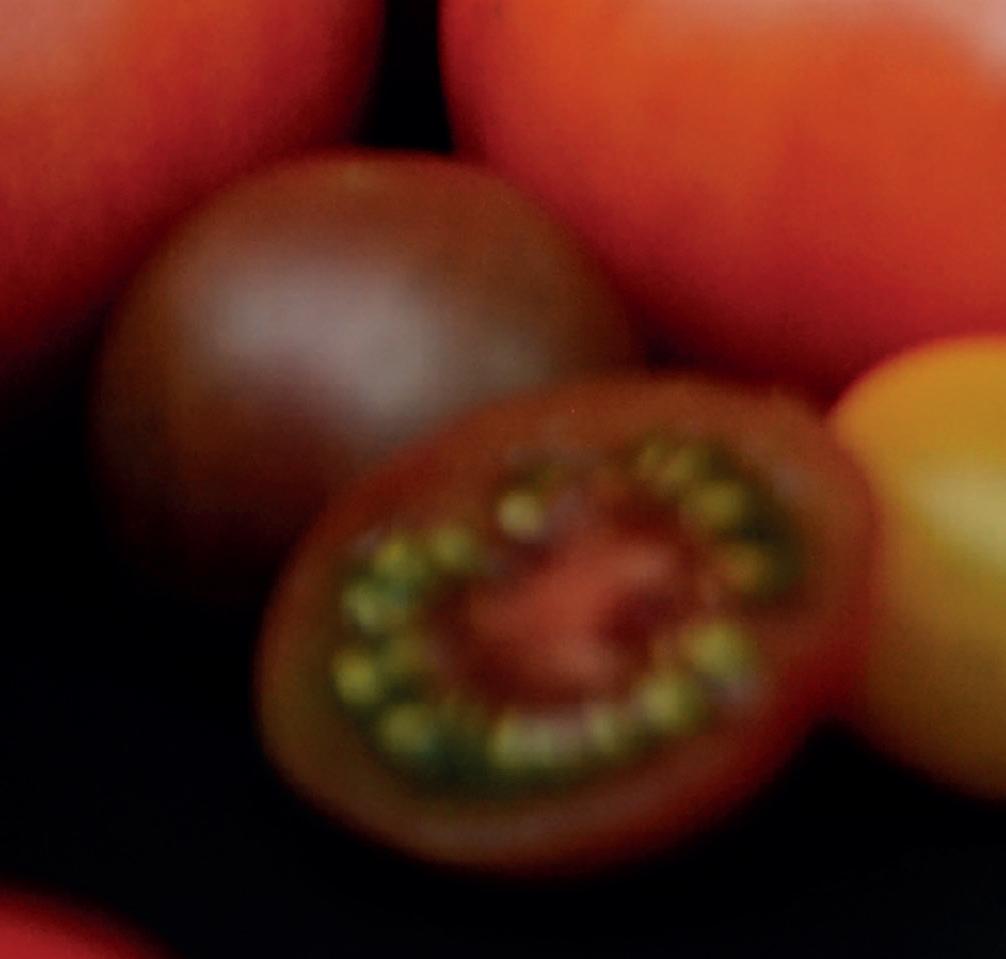


doc.indd 1 21/04/2023 15:34
Enza Zaden expands HREZ offering
by Maura Maxwell @maurafruitnet
The discovery of tomato brown rugose fruit virus (ToBRFV) in 2014 fired the starting gun on a race among seed companies to find effective solutions to one of the most destructive diseases to affect the crop. Following its breakthrough in identifying a gene with high resistance to the virus in late 2020, Enza Zaden has made significant progress in integrating this trait into its current genetics. Today it offers varieties with high resistance to ToBRFV, marketed under its HREZ label, across the main product segments for both heated and non-heated markets.
“Last year we introduced more than 1,000ha of HREZ material globally,” product manager Frank van Antwerpen tells Fresh Focus Tomato. “We focused first on the Iberia, Mexico/US and Benelux regions where ToBRFV hit the hardest. For the upcoming season we expect to add varieties in all the common segments and expand towards new regions. From this year we will have a full assortment of HREZ material and can finally make sure that tomato producers can ‘grow’ again.”

Breeding, trialling and seed production take time, but such was the urgency with ToBRFV that Enza Zaden knew it had to pump significant resources into finding a solution. “Looking at the timeline of our HREZ material, it took us only 7-8 years before we had found the high resistances, implemented them, tested them and sold the first seeds towards our customers,” says Jean Francois Thomin, marketing manager, West Europe.
Disease resistance is just one of the traits that Enza Zaden has to factor in when developing new varieties. They must also be mindful of other grower concerns such as labour, yield and climate change. The la er, in particular, makes it a priority to produce resilient plants that can handle more extreme temperatures.
And with high energy and input costs pu ing added pressure on producers, seed companies have an important role to play in mitigating the impact of inflation. “A plant that can be grown with lower temperatures will save energy costs, that’s why we are breeding for a balanced generative plant with enough vigour,” Antwerpen says. “We’re also looking at automation and the requirements this sets for plant architecture.”
As Thomin explains, breeding is about looking into the future to try to work out what will happen. “Will we get more vertical farming? What does that mean for the plant? Will the energy crisis last? Will robots be applied widely? Will tomatoes be a superfood and what kind of nutrients will be important as a superfood? These questions and hundreds more we ask ourselves every day and we try to prioritise as much as possible,” he says.
Last year, Enza Zaden teamed up with family-run Dutch tomato company Duijvestijn Tomaten to open a state-of-the-art R&D facility with hybrid lighting where it tests and shows all its genetics.
“In our opinion the only way to be ready for the future is to have these collaborations with key growers worldwide, creating value together,” says sales manager Maarten van den Heuvel. “ At this facility we can show our genetics grown in a practical way. Last year we welcomed hundreds of visitors who were convinced to choose for our HREZ genetics as a result of their visit.”

12 fresh focus tomato NETHERLANDS
From this year, the company will offer varieties with high resistance to ToBRFV across all main product segments.
p.12.indd 12 21/04/2023 09:52
TOP (l-r)—Martijn van Stee, Sergio de la Fuente van Bentem, and crop research director tomato, Kees Konst LEFT—Enza Zaden’s HREZ label
With high resistance against ToBRFV
Now we can grow!
Interested? Find out more about HREZ here.

We’ve developed high resistance tomato varieties against ToBRVF - strong and uncompromised in quality. Together with our sanitary measures we are creating a brighter future for all.

Enjoy tomatoes all day
Wim van den Berg, marketing manager of Prominent, Growers United’s tomato brand, says healthy and tasty tomatoes should be enjoyed across multiple meal occasions.
 by Carl Collen @carlfruitnet
by Carl Collen @carlfruitnet
How is business progressing at Prominent?
Wim van den Berg: Prominent’s tomato acreage is consolidating. Companies are getting bigger as growers merge with each other. Synergy and scale further optimise cultivation and management. Due to the pressure of the tomato virus ToBRFV, more growers
have switched to cucumber cultivation this year. In Morocco, we see further opportunities in acreage growth and innovations in varieties.
What is the outlook for the tomato market in 2023?
WVDB: Consumers are pricesensitive due to high inflation and are moving towards cheaper
alternatives and price/volume promotions. When consumer confidence and disposable income grow again, there will be more room for the more premium products. It is important to adjust your assortment accordingly and move with the market.
Is enough being done to market the qualities of tomatoes to consumers?
WVDB: The versatility of the tomato cannot be promoted often enough, like encouraging more eating occasions per day. It is also important to highlight

NETHERLANDS
Getting everyone to taste the finest of Tomato Creativity drives us forward Route d’Avignon - 13630 EYRAGUES - FRANCE Tél. +33 (0)4 90 240 240 - Fax +33 (0)4 90 240 250 gautiersemences.com DISCOVER OUR FULL RANGE OF TOMATOES AP_TOMATES_210x143_FRUINET_2023_EN.indd 1 20/04/2023 14:23 p.14-15.indd 14 21/04/2023 10:43
natural ingredients and healthy food as a source of energy. The tomato gives you energy on a daily basis.


What message would you send to the industry?

WVDB: Let’s enjoy our tomatoes any time of the day. Together we face the challenge of having more consumers enjoy our tomatoes at various times throughout the day. Tomatoes mean more enjoyment, more vitamins and more energy – in short, a healthier life.

Wondering how we use our knowledge of unconscious brain processes to influence shoppers to choose a healthy tomato more often? Visit the Global Tomato Congress to find out. We look forward to seeing you there!
How is Prominent coping with rising costs and other potential obstacles?





WVDB: The main challenges include managing high energy costs. High fluctuations of gas and power prices create high business risks. We are investing
in and applying new techniques such as LED lighting and new heat facilities such as geothermal heat.

Then there is the ToBRFV virus. You must keep the virus out through strict hygiene protocols and develop new tomato varieties that contain resistance to the virus.
What are the key traits you look for when it comes to tomato varieties?

WVDB: Taste and presentation are obviously important criteria. Another crucial trait has now been added, and that is resistance to the ToBRFV virus. Varieties must also be increasingly resistant to changing climate conditions, such as temperature and water use.
do you nudge

LEFT—Tomatoes should be enjoyed during any meal throughout the day
ABOVE—Prominent marketing manager Wim van den Berg


NETHERLANDS
Together, we face the challenge of creating more tomato moments among consumers. Wondering how we use our knowledge of (un)conscious brain processes to influence shoppers to choose a healthy tomato more often? Visit the Global Tomato congress to find out. We look forward to seeing you there! How
the shopper in
right direction? 20/04/2023 14:23 p.14-15.indd 15 21/04/2023 10:43
the
Belgian tomato growers focus on quality and innovation, as trade with the UK flourishes


Den Berk Délice was founded by four entrepreneurs with the same passion and vision: to improve and modernise the tomato category. Focusing on expertise, quality and innovation, Den Berk Délice produces about 16,000 tonnes of tomatoes every year. 35 per cent of that volume goes to Belgian retail, while 65 per cent is exported, mainly to Germany, Norway, Sweden and the UK. All companies of the group Den Berk Délice are member of Coöperatie Hoogstraten.
INVESTING IN UK RETAILERS
There is clear demand in the UK for Belgium tomatoes, which already imports over 14,500 tonnes from the EU nation. Consumer trends, pointing to a sustained rise in healthy eating, combined with fresh food shortages seen on UK supermarket shelves in the first months of 2023, demonstrate a clear need for the UK to import high-quality fruit and veg, from a variety of countries, to supplement domestic production. With Belgium the closest country to the UK, the two nations are natural trading partners, particularly for fresh produce, and grower Den Berk Délice has identified the opportunity to ramp up sales of its high-quality tomatoes to the UK.

“Our proximity to the UK clearly enables us to supply the freshest possible tomatoes, which is vital to our business,” says Den Berk Délice
founder Hans Van Gool. “Den Berk Délice’s chosen tomato varieties are selected for their excellent taste, rather than only focusing on a long shelf-life, giving us an advantage over competing suppliers.”
All tomatoes from Den Berk Délice are sold by Coöperatie Hoogstraten. The cooperative manages a highly efficient and short supply chain, which ensures the UK receives the freshest product possible. “For UK buyers, we believe theret are various advantages to sourcing our tomatoes,” Van Gool continues.
“Located just north of the city of Antwerp, Hoogstraten is

approximately 400km by road from London and New Covent Garden Market and can therefore be in the UK the same day.
“We know we have the quality and supply to meet the need of UK consumers, by strengthening our relationship with key industry players in UK retail, there is huge potential for Den Berk Délice and other
16 fresh focus tomato ADVERTORIAL
p.16-17.indd 16 21/04/2023 09:59
The compiler of this publication is solely responsible for its contents. The European Commission is not liable for any use that may be made of the information contained therein.
Belgian growers focused on quality to continue expanding further.”
QUALITY REMAINS KEY
Like many growers in Belgium, Den Berk Délice is focused on taste and quality as opposed to high volumes. Every year, the organisation carries out more than 100 variety trials to identify and select the tomatoes with the highest quality in each category. Den Berk Délice group has a total of 90ha under vine and a strong reputation for supplying high-quality and flavourful tomatoes to major retailers throughout Europe.
“Since our founding, Den Berk Délice has made the strategic choice to focus on the production of high-quality and tasty tomatoes like cherry tomatoes on the vine and snack tomatoes.” Van Gool continues. “Over the years, we have developed a strong position selling into the grocery sector, initially not with the intention to become the largest supplier, but to distinguish ourselves by our quality credentials.”
HOLISTIC HORTICULTURE
A growing influence on purchase for UK grocery shoppers is the sustainability credentials and broader company purpose of the produce they are buying. For Den Berk Délice, a holistic approach to sustainability has been considered in every area of the business.
Sustainability is a core consideration during production and an area Den Berk Délice strives to make continual improvements in. All members of Den Berk

Délice are GlobalGAP, GRASP, BRC and SEDEX certified and in recent years the organisation has adopted AR-coated diffuse glass in its greenhouses and switched to LED lighting instead of Son-T lights resulting in an energy reduction of 40 per cent.
“Looking to the future, we are reviewing our targets and we are redefining an action plan every year,” says Van Gool. “For example, energy use is a very important factor within our sustainable environmental policy.
“In our cultivation process we need heat,” he notes. “At the moment CHP technology, also known as Cogeneration, is the most fuel efficient and environmentally friendly way to use a fossil or renewable fuel to provide a combined output of heat and power. On the other hand, we use solar energy for our sorting station. In the near future we are going to expand our photovoltaic installation from 1,200 solar panels to 2,580 solar panels.”
Beyond environmental initiatives, a great deal of effort is also being made by Den Berk Délice in terms of actions on corporate responsibility. Special attention has been placed on the company’s project Siddartha which helps young people in Ethiopia.
“Despite the impact of the ToBRFV virus in the production of tomatoes and the increased costs of energy, raw materials, labour and services, Den Berk Délice is very hopeful for the future,” Van Gool adds.

“We are looking forward to the new season, enabling consumers to enjoy healthy and tasty tomatoes at any time.”
RESPONSIBLY FRESH
The VLAM UK promotional campaign is set to drive awareness of fresh, seasonal produce from Belgium. These producers and exporters, in close proximity to the UK, offer a wider variety of products, all of which are of exceptional quality, sustainably grown and rich in flavour.

The Belgian fruit and vegetable cooperatives have committed to sustainable development and have been part of a collective initiative ‘Responsibly Fresh’. The project shows producers actively taking responsibility for making the agri-food chain more sustainable. The campaign, ‘Loved in Britain, made in Europe,’ will highlight the significant investment made around biodiversity in farming, reducing impact on the environment for production in particular.
To find out more visit www. belgianfruits andvegetables. com/en
17 fresh focus tomato ADVERTORIAL
p.16-17.indd 17 21/04/2023 09:59
The UK needs more POs, says BelOrta
CEO of Belgian fresh produce co-op advises British growers to form more producer organisations to help them command higher prices with retailers.
 by Fred Searle & Tom Joyce @fredfruitnet @tomfruitnet
by Fred Searle & Tom Joyce @fredfruitnet @tomfruitnet
UK growers should group together and set up more producer organisations and cooperatives to give themselves greater bargaining power in the face of intense price pressure from their retail customers.
This was the message from Philippe Appeltans, the CEO of Belgian fruit and vegetable cooperative BelOrta, amid major shortages in a range of salad vegetables and other produce at UK supermarkets.
A group of BelOrta’s growers were taken on a tour of UK retailers and farms by Fruitnet Media International managing director Chris White in March to explore
Hoogstraten turns 90
LEFT—BelOrta says producer organisations help ensure reliable supplies
Hans
opportunities to boost exports to Britain post-Brexit.
The cooperative has around 1,000 grower members and exports a range of fruits and vegetables to the UK and across Europe. Products include tomatoes, cucumbers, peppers, pears and berries, as well as leafy greens, various vegetables, herbs and mushrooms.
Speaking on BBC Radio 4’s Farming Today programme, Appeltans emphasised the advantages of POs like his own in giving growers greater bargaining power, a stronger position in the value chain, and reliable supply thanks to the larger quantities
This year marks the 90th anniversary for Belgium’s Hoogstraten, but the big celebrations remain on hold as the cooperative navigates what has been a difficult year due to the energy crisis, with growers delaying production due to high costs.
Thankfully, according to Jan Engelen, the price of energy is now significantly down, but many tomato growers are seeking to lower their future risk, focusing less on specialty varieties and even devoting greater acreage to alternative crops like cucumbers and peppers.
Following the end of merger talks with REO Veiling, the cooperative is now forging ahead with its own strategy. “We are going to reform certain things, and we have an expansion plan in place,” says Engelen. “We want to grow further in tomato specialties. We have some nice things planned when it comes to marketing and we are focusing much more on social media.”

18 fresh focus tomato BELGIUM
BELOW—
Hoogstraten
MD
Vanderhallen and chairman Dirk Van den Plas
» p.18-20.indd 18 21/04/2023 10:32

doc.indd 1 17/04/2023 10:20
of produce they can offer customers.
“Growers can focus on growing top-quality produce, and BelOrta takes care of the marketing, sales, and food safety regulations,” he said. “This is a win-win for our customers.

“If our people do the quality checks, there’s no need that they [importers] double the quality checks, and in the end, there will be more money available for the growers.
“So, my advice to UK growers is please set up producer organisations, come together, and then you have some power. Also, you have the resources to innovate on new varieties, packaging, marketing concepts, and so on. You need a certain scale [for this], that’s for sure.”
As it stands, the UK has considerably fewer POs than its European neighbours Belgium and the Netherlands. And following the UK’s departure from the European Union, Britain’s existing POs will lose funding under the EU’s existing Fruit and Vegetables Aid Scheme in 2025.
In its recently published ‘UK
horticulture growth strategy’, the NFU stressed it is “critical” that Britain’s replacement scheme is finalised as soon as possible, with no further delays in its development.
NFU horticulture chair Martin Emmett said Appeltans’ comments were “fair” but that “we have to look at it sector by sector and recognise the level of consolidation and cooperative activity already in place in the UK”.
He argued that some UK horticulture sectors like soft fruit are possibly already at the “maximum point of PO development”, while other such as tomatoes and peppers are heavily consolidated.
The tomato sector is dominated by major suppliers such as APS Group and Thanet Earth, so there are a limited number of players that may choose to join forces, he pointed out.
As well as offering advantages in terms of marketing and bargaining power, POs give growers greater collective strength to finance advances in technology, automation and other areas, according to Emmett.
Stoffels keeps sustainability simple
The aim of Belgian tomato grower and packer Stoffels is to try to make the supply chain as short as possible, according to Paul Stoffels (below). “We do the marketing ourselves,” he says. “We produce, we pack, and the next day the tomatoes are in the shops. We work directly with retailers in Belgium and Europe, as well as in Dubai and Singapore.”
For Stoffels, sustainable packaging is an important focus, but just as crucial is making sure consumers know what to do with that packaging afterwards.
“Whether the packaging is compostable or recyclable, it’s very important to make it clear to consumers what they have to do,” he says. “We are moving to plastic-free packaging, but it’s not always so easy because if the visibility of the product is reduced, then sales go down. We have a plastic-free solution for every product we sell, including paper boxes with cellulose windows, which can all go in paper recycling. But you have to explain that to consumers and make it easy for them to recognise how to dispose of it.”

20 fresh focus tomato BELGIUM
p.18-20.indd 20 21/04/2023 10:32
LEFT—BelOrta’s Philippe Appeltans on BBC Radio 4’s Farming Today programme

Your one stop shop for the complete tomato selection Freshly harvested every day Extensive range (+50 varieties) Focus on innovation More info about our tomatoes and other produce? Contact +32 (0)15 565 617 or sales@belorta.be BELORTA_ADV-TOMATEN_A4_EN_v01.indd 1 05/04/2023 12:14
UK “will see fewer British tomatoes”

Higher costs put pressure on growers and could lead to a shortfall in UK-grown tomatoes this year, according to reports.
by Carl Collen @carlfruitnet
The vegetable shortages that hit the UK in the opening quarter of 2023 saw some retailers ration certain fresh produce lines, following unusually cold weather in Europe and North Africa. And for UK tomatoes specifically, the prospects are potentially gloomy moving forwards, with rising energy costs leading to what the National Farmers Union has said could be the lowest British tomato harvest since 1985.
Many growers are being forced to make cuts or even shut down altogether, with Lea Valley Growers Association secretary Lee Stiles telling The Guardian that some are switching to more lucrative crops while others are closing.
“There will be fewer British tomatoes on the shelves this year,” he told the publication in mid-April, noting that around half of his association’s growers had yet to plant tomatoes and therefore would have to wait for at least another three months to harvest the fruit.
The Guardian reported that, in a typical winter, only about 5 per cent of the tomatoes consumed in the UK were grown in Britain, and this winter it was probably a lot less with farmers facing up to higher bills for the light and heat required to grow them. In the summer months this can soar to over 50 per cent, but they are
LEFT—British volumes are forecast to fall
BELOW—Highprofile vegetable shortages hit the UK in February and March 2023

still all grown in greenhouses that require heating – mainly with gas – and costs have skyrocketed since the war in Ukraine began.
In addition to energy bills, other areas such as labour costs, plastic packaging and fertiliser have all increased in price, with overall costs up by about 30 per cent. According to the latest average wholesale prices collected by the Department for Environment, Food and Rural Affairs, a kilogram of round tomatoes costs £3, 14 per cent more than a year ago and more than double the average of the previous three years.
However, Stiles told The Guardian that tomato shortages were unlikely due to European supply in the summer. “There probably won’t be shortages as usually the Dutch fill the gap, but it depends if the supermarkets are prepared to pay their price or choose empty shelves,” he said.
22 fresh focus tomato UK
p.22.indd 22 21/04/2023 10:07
In addition to energy bills, other areas such as labour costs, plastic packaging and fertiliser have all increased in price
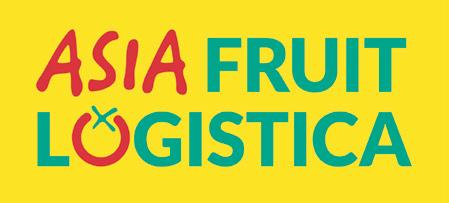
6-8 September 2023 doc.indd 1 26/10/2022 10:20
P3P Partners acquires UK tomato specialist APS
Deal will provide funding to further the growth and development of APS in other areas of the industry.
by Maura Maxwell @maurafruitnet
Cheshire-based A Pearson Holdings Limited (APS), which grows over 500m tomatoes a year in the UK, has been acquired by the P3P Partners group. The Pearson family, and other former shareholders, have sold 80 per cent of the business to P3P for an undisclosed sum. This provides the business with access to additional funding to further grow and develop into other fresh produce areas.
The management team at APS, led by Mark Pearson as CEO, will continue to run the business on a day-to-day basis. Paul Allen has joined the business as executive chairman to enhance the growth plans of the business.
APS is the UK’s leading supplier of British tomatoes to the high street and the largest organic producer of tomatoes in the UK. The company also grows peppers, cucumbers and aubergines for major retailers. P3P, a sustainable energy and agri-tech specialist, has been an operating partner of APS for over ten years, providing heat, power, light and CO2 at all of the company’s growing sites.

Pearson commented: “Being part of a family-run business meant I was keen to ensure we found the right partner to take the company to the next level, and I’m confident
we have achieved this with P3P.
“This is an exciting next step for the business, and we look forward to the future with confidence and enthusiasm. It’s very much business as usual for everyone involved in APS and these recent changes will help us to strengthen the excellent services and produce we provide to our customers.”
Julian Harris, partner at P3P, said: “We are thrilled to work with APS and build upon the rapid growth it has achieved, which has seen turnover rise from around £7m in 2006 to over £100m in 2022.
“Food security is a critical issue for the UK, and APS plays a vital part in growing British fresh produce sustainably. This investment adds to P3P’s strong track record in the food, agri-tech and sustainable energy sectors. We look forward to supporting the management team in the future development of the company.”
Allen commented: “APS currently grows a third of all British tomatoes and is in a strong position to meet the rising demand of consumers for great quality British tomatoes. I’m looking forward to strengthening APS’s position and broadening the offer of fresh produce grown. The partnership and investment with P3P will help us to drive the APS brand and support plans for new areas of growth.”
ABOVE—APS grows over 500m tomatoes annually in the UK

24 fresh focus tomato
UK
p.24.indd 24 21/04/2023 10:11
“This is an exciting next step for the business, and we look forward to the future with confidence and enthusiasm”

doc.indd 1 11/04/2023 15:05
Innovation breeds success for Semillas Fitó
The Barcelona-based company outlines its formula for bringing profitable new varieties to market.
by Maura Maxwell @maurafruitnet
One of the biggest breakthroughs in tomato breeding this decade has been the ability to develop varieties that are resistant to ToBRFV, a highly destructive virus that was first discovered in Israel in 2014. Because it is spread easily through mechanical transmission and has an incubation period of two to three weeks before symptoms appear, the virus is extremely difficult to contain once a localised outbreak begins and has consequently spread rapidly across Europe, the Americas, Asia and Africa.
Like many seed companies, Barcelona-based Semillas Fitó has prioritised making ToBRFV resistance standard across its entire range of tomato varieties. According to business development director Eduard Fitó, it is making good progress towards achieving this aim.


“ToBRFV is the priority right now. Mulan, our plum cherry tomato, is showing a good tolerance level, while two of our round tomatoes, Thor and Odin, are doing very well in Mexico due to their strong performance even with ToBRFV. And in the vine segment, Alcazaba is also outstanding,” he says.
Fitó acknowledges, however, that bringing new varieties to the market with ToBRFV resistance is not an easy endeavour. “We know that within our current portfolio there is a range of tolerance going from very susceptible to an acceptable
level of tolerance. But now the challenge is the introgression of genes that bring resistance to all our varieties, and this is something that cannot be done in one year. So, we need patience and to utilise all the strategies at our disposal,” he explains.
When it comes to breeding, he says Semillas Fitó has two strategies: the first is to improve the yield/cost ratio, which it tackles by targeting production, uniformity and waste in order to increase yield, and focusing on labour reduction and disease resistance to lower the cost to the grower.
The second, is higher incomes. “This strategy is very much linked to bringing added value to the end consumer, flavour and convenience being the key objectives,” Fitó explains.
Given that it can take up to ten years to bring a new variety to market, it is essential to be confident that it will create added value and generate demand. To be sure of this, the company takes into account the views of all stakeholders – growers, shippers, retailers and consumers.
“We have to set up new ways of ge ing intel from all of these and translate this information to the breeders so that they can create new variability and select the right plants accordingly,” Fitó says.
TOP RIGHT—Eduard Fitó
RIGHT—Anticipating market trends is important in developing new varieties, according to Semillas Fitó
“One of the ways we do this is by engaging people to spot new market trends or anticipate latent demand. Once all the information has been gathered, we discuss in multidisciplinary teams what the future varieties will look like.”
This process has led to such innovations as Wabi-Sabi, Semillas Fitó’s new garnish tomato. Named a er the Japanese aesthetic that celebrates the beauty of imperfection in all aspects of nature, the variety aims to overcome the misconception that the quality of a piece of fruit is linked to its aesthetic perfection. According to Fitó, Wabi-Sabi “combines excellent flavour, shape and taste in a way that will brighten up any dish”.
26 fresh focus tomato SPAIN
p.26-27.indd 26 21/04/2023 10:13
Almerian tomato company to test new smart labels
The eTIC4Food label aims to provide greater transparency and traceability as well as nutritional information for consumers.
by Maura Maxwell @maurafruitnet
Agroup of Spanish companies has developed a new smart label to add value to their fruit and vegetable offer by improving traceability and providing product information to consumers.

The eTIC4Food label is the brainchild of Caparrós, Hispatec, Tecnova and the Almería Science & Technology Park (Pita), the companies that make up the consortium that bears the same name. Trials will be carried out
in the coming months, initially focusing on Caparrós’s premium Lobello cherry tomatoes and watermelons, before being rolled out to other fruit and vegetable producers in Andalusia who wish to apply to use the label.
“The label incorporates NFC technology and a QR code, two applications that will allow greater
transparency and control in the traceability of the product and convey information that is currently highly valued by the consumer,” explains Pita’s director of innovation, Alicia Cañadas.
Caparrós has provided all the information related to the two products which will be loaded onto the smart label, designed and developed by Hispatec. In addition, Tecnova will provide information on the nutritional content of the products based on analyses it has carried out.
According to María del Mar Gómez from the University of Almería, one of the key benefits of the smart label is to make it easier to track products in the event of a food alert, since “traceability and food safety go hand in hand”.
Pita says the aim of the project is to offer the sector an “innovative tool that provides added value for the producer and the consumer”.
SPAIN
Trials will be carried out in the coming months on Caparrós’s premium Lobello cherry tomatoes and watermelons
p.26-27.indd 27 21/04/2023 10:13
Duroc reiterates commitment to sustainability
The Moroccan group is investing in new ways to reduce its impact on the environment, with packaging waste, water efficiency, and organic waste recycling all identified as priorities.
by Tom Joyce @tomfruitnet
Across much of Europe, soaring energy prices have forced tomato producers to limit their production or even consider leaving the business. This is placing ever greater responsibility on overseas producers in countries like Morocco to keep the retail shelves stocked.


Duroc, a member of Delassus Group, produces and exports snack tomatoes for 12 months of the year, with the aim of combining top taste with affordability. The company produces 65,000 tonnes of snack tomatoes on 600ha of land between Agadir and Dakhla and commands a 32 per cent share of the UK market and 12 per cent of the German market.
For Duroc, a major reason for the group’s growth over the last 30 years has been its commitment to sustainable development. “We set up an effective CSR commi ee to structure our ambition, to lead and to support the implementation of actions that will be validated by the Delassus Group board of directors,” said Kacem Bennani Smires, CEO of Delassus Group.
Both the shareholders of the Delassus Group and the management want to be part of an organised, measurable CSR approach, he confirmed. Although the group has already had its carbon footprint audited by Bureau Veritas, and says that the arboricultural part of the business sequesters more carbon than it
produces, Duroc is clear on the need to reduce its impact through further actions.
Three focuses for the company are reducing packaging waste, optimising water usage and recycling organic waste. “Besides helping the planet, new practices can have a positive financial impact,” Duroc states. “For example, reducing the use of packaging materials can reduce spending and improve fuel efficiency. Solar energy has proved to be extremely beneficial not only for the environment but also for the business as per the experience conducted in the citrus field within Delassus Group. The investment is ongoing in Duroc as well.”
When it comes to its employees, Duroc says its focus is on retention and engagement, limiting the use of temporary workers by offering benefits such as support for health, team building, providing transport and sponsoring educational support for workers’ children.
“For community engagement, Duroc has come up with many ways to give back, including fundraising via the Fairtrade programme with Coop’s UK consumers and Keelings,” the company stated. “Duroc is on the verge of constructing a pre-school for the benefit of 300 children in neighbouring communities, including its workers’ children. The allocated budget for this is €500,000.”
However, the company also offers a reminder that to be sustainable, a business must also be profitable. “Profitability is about compliance, proper governance and risk management,” the company says. “Duroc has evolved over the past decade to become more complex with increased investments. Governance had to be reviewed to ensure that it could continue to develop safely. Duroc was managed directly by the shareholders: Zhor Bennani Smires and Kacem Bennani Smires. But they decided to review the organisation and get out of operations so they could play their full role as shareholders. They decided to entrust the management of Duroc to an experienced and talented managing director.”
28 fresh focus tomato MOROCCO
p.28.indd 28 21/04/2023 10:13
ABOVE—Duroc produces 65,000 tonnes of snack tomatoes between Agadir and Dakhla






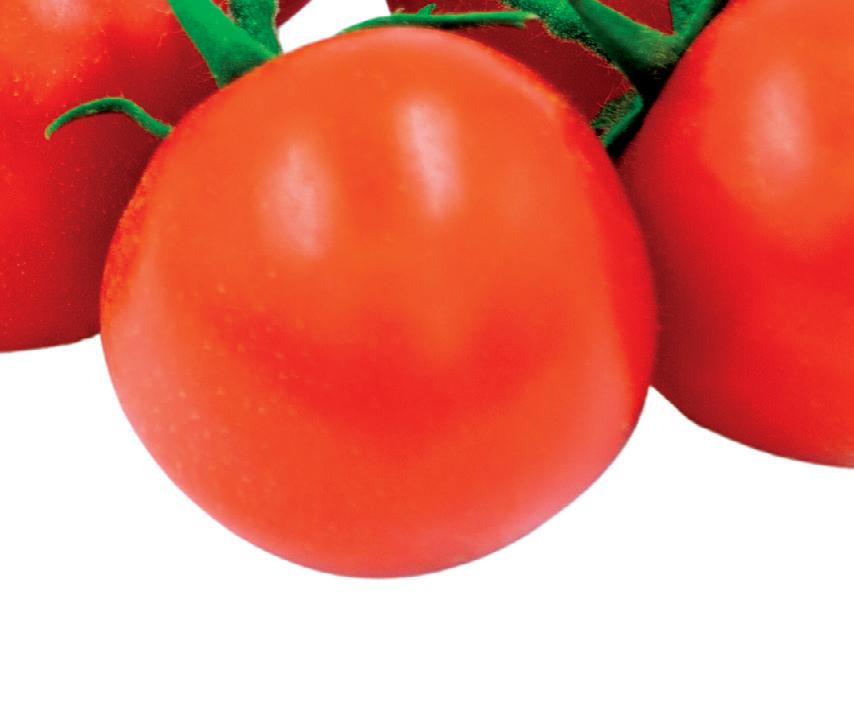








NO FEAR OF ToBRFV NO FEAR OF SUCCESS. www yukselseeds com I info@yukselseeds com @Yukselseeds doc.indd 1 20/04/2023 10:09
Breedx on track with innovative varieties
Breedx’s latest tomato varieties benefit from the breeder’s ability to increase soluble sugars and control sucrose, glucose and fructose levels, using classical breeding techniques.
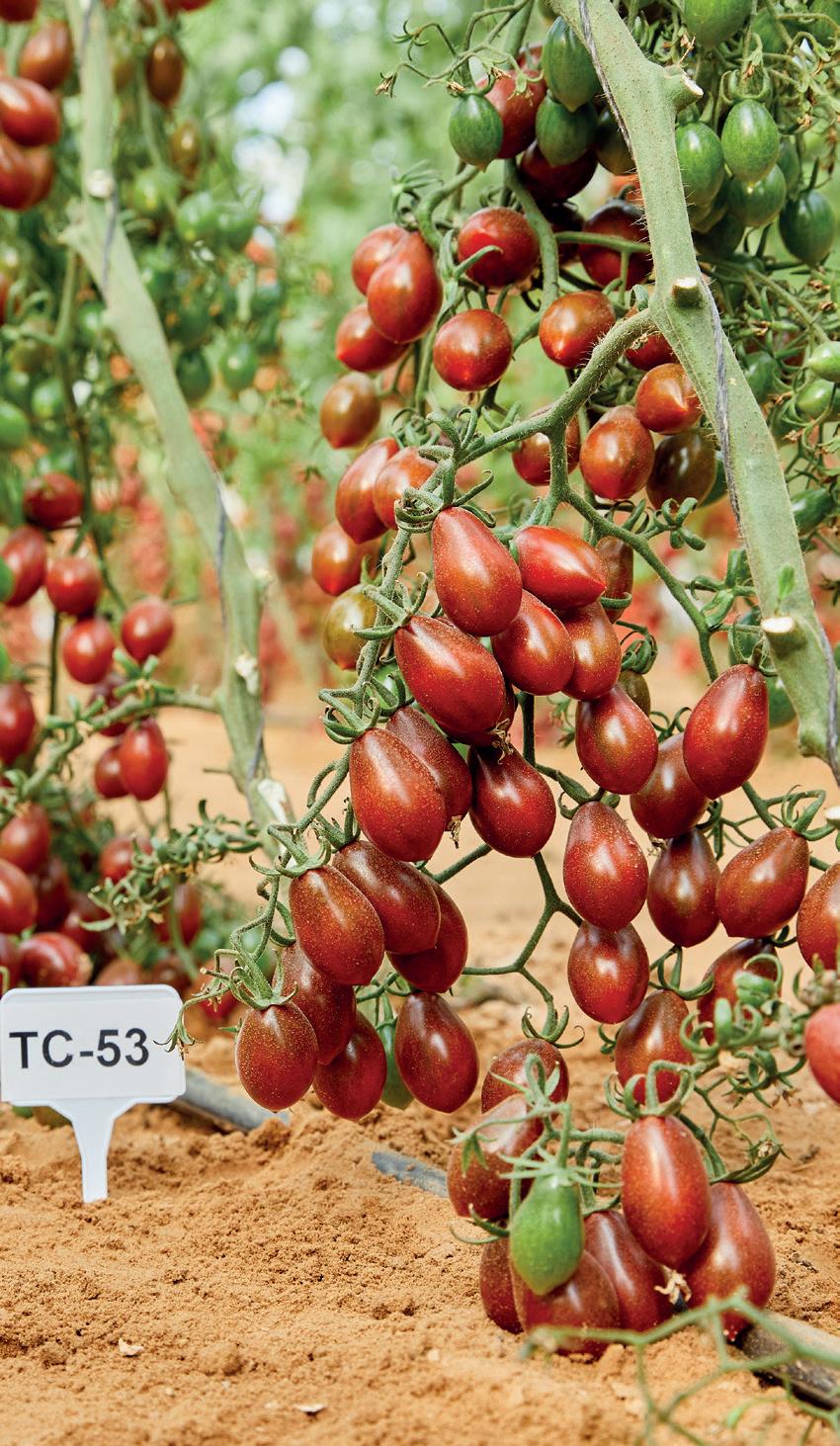 by Gerry Kelman
by Gerry Kelman
Breedx, the vegetable varietal development company, has taken the well-worn cliché of ‘Tasty Tomato’ and, using classical plant breeding techniques, is well on the way to commercialising innovative varieties.
Tomato Taste Programmes, which involve naturally altering the fructose-glucose ratio and the balance between sweetness and acidity, were being developed as far back as 1986. In Israel, a Volcani Center research group led by Dr Ari Schaffer and Dr Moshe Bar (who later joined Zeraim Gedera/ Syngenta) worked with the goal of developing tomato varieties with improved taste, reminiscent of the “tomatoes of old”.
The strategy adopted was to utilise wild species of tomato to modify and improve sugar metabolism and accumulation in the commercial tomato fruit. Today, the same researchers have reunited in the framework of Breedx.
All cultivated tomatoes contain approximately equal amounts of the two hexoses, glucose and fructose, while the disaccharide sucrose is absent. During the research programme, the trait of sucrose accumulation was successfully transferred by classical breeding techniques, molecular markers for the trait were developed and the breeding group was able to create novel varieties of sucrose-accumulating tomatoes.
The breeding group is able to increase soluble sugars and control sucrose, glucose and fructose levels, controlling the sugar-acid ratio by the use of molecular markers linked directly to specific traits.
Varieties being developed in this programme are all aimed at single pick tomatoes with a fruit size of 8-25g and a Brix of no less than 9. There are two basic colours – chocolate/brown and shiny red – while some varieties have highly-a ractive mo ling and striping. These varieties are being trialled today worldwide, in Europe, North America, Japan and South Africa.
Lior Carmeli, CEO of Breedx, comments: “This intensive tomato activity at Breedx is in parallel with continuous development of the seedless sweet pepper segments – three colours, from small one-bite fruits to mini-capia”.

BELOW—Innovative tomato varieties from Breedx are on trial globally
Tomatech and Nirit seek new balance together
Harmoniz, established in a merger between Tomatech and Nirit Seeds, is a vegetable varietal development company focused mainly on tomatoes. The company is based in Israel and has breeding and marketing operations in Spain, Italy, the Netherlands, the UK, Mexico, Canada, South Africa and Morocco.
“Our challenge is for the breeders to develop, for both the growers and the consumers, the balance between flavour and yield while ensuring high quality,” says Ofer Ben Zvi, CEO of Harmoniz. “Tomatoes have to be tasty to drive repeat purchases and we breed for an enjoyable eating experience.”
An innovative feature of Harmoniz breeding is the special berry segment TomaMuse, a full range of colourful and unique small tomatoes with varied shapes, very palatable texture and outstanding flavour. The TomaMuse has eye-catching capsicum/strawberry shapes; colours of lustrous red (below), orange/lime/yellow and burgundy colours that change as the fruit ripens; a firm texture together with complex and surprising flavours to make it the ultimate culinary tomato. For the grower, the plants are small and compact with short internodes, good disease resistance and prolific yield.
30 fresh focus tomato ISRAEL
More 525 Meet horticulture Organisation: p.30-31.indd 30 21/04/2023 10:17
GreenTech Amsterdam 2023: Theme knowledge programme announced
The knowledge programme of GreenTech Amsterdam, the global horticulture platform, will be all about ‘Your connection to sustainable food and flower production’.
S pecific topics such as smart lighting, plant health, resilient cultivation and robotics are covered. But themes like partnering in the value chain, supply chain integration, biodiversity and sustainability challenges in the horticulture sector are also on the agenda at the Vision, Technology and Plant Compound/Vertical Farming Stages.
In total 525 exhibitors and 11,000 visitors will be expected on the show floor. GreenTech Amsterdam will take place from 13–15 June at RAI Amsterdam Convention Centre.
WHAT VISITORS CAN EXPECT
Highlighted topics include: ‘Fossil free cultivation concepts: the road to a zero-footprint greenhouse’; ‘Challenges and opportunities to move Vertical Farming forward’; ‘Collecting data, how much is enough?’; ‘Cultivation planning with algorithms’; ‘Leafy, lettuce and herb greenhouse culture’;
‘How robots are conquering horticulture’; ‘Optimal use of limited CO2 in production process’; and ‘Plant Compounds: Cannabis innovations’.
Side events at GreenTech Amsterdam include the Innovation & Concept Awards, Meet the Xpert sessions organised in a campfire setting, Power Day networking sessions and a GreenTech Party, as well as bus tours to industry frontrunners.
On the show floor, visitors will find several country pavilions but also pavilions with exhibitors that specialise in industry fields such as vertical farming, plant compounds, artificial intelligence and robotics, and renewable energy. There will also be a start-up pavilion for newcomers to the horticulture industry, as well as live demonstrations. The latest innovations will feature in special showcases that are found at the Robot Arena and the new Renewable Demo Area.
ABOUT GREENTECH


GreenTech Amsterdam is a global meeting place for all horticultural technology professionals with the focus on the early stages of the horticultural chain and the current issues growers face

ADVERTORIAL
Spotlight
Register now! Organisation: Partner: GET YOUR FREE VISITOR TICKET UNTIL 5 JUNE (NORMAL PRICE 95EUR).
Experience horticulture solutions, find the latest innovations and get inspired. More than 100 knowledge sessions.
on Vertical Farming, Plant Compounds (Cannabis), AI & Robotics and Renewable Energy. More than 11,000 horticulture professionals and 525 exhibitors from all over the world. Meet the worldwide horticulture community
p.30-31.indd 31 21/04/2023 10:17
The future is now for Syngenta
Syngenta and Four Growers are collaborating to create the future of tomato production through robotic tomato harvesting.

 by Carl Collen @carlfruitnet
by Carl Collen @carlfruitnet
Syngenta Vegetable Seeds has revealed that it recently worked with Pittsburgh-based Four Growers Inc to test the GR-100 robotic harvester in its tomato research. The aim, according to Syngenta, is to optimise the production of tomatoes given that the future of food supply will require greater efficiencies, sustainable practices and yield maximisation.
“This collaboration helps serve as a link between genetics and automation,” said Ruud Kaagman, Syngenta global crop unit head for tomatoes. “The success of robotisation in the future is the application of robotics with different plant characteristics. With this collaboration you’ll see varieties adapted to robotic harvesting to enable growers’ success.”
The group said that its work with Four Growers could lead to faster crop advancements, reduced food waste, and more satisfied growers and consumers. “Robotics paired with genetics put technology and nature together to create a be er future for this healthy crop eaten around the world,” it stated.
LABOUR COSTS
Tomatoes are mainly harvested by people, which accounts for a sizeable portion of overall production costs – up to 30 per cent of the total, Syngenta noted. On top of costs, growers are finding it more difficult to find enough labourers, and they need solutions to ensure consumers have access to the tomatoes they need.
“Using robotics in agriculture will enable us to eat higher quality, healthier, more affordable produce,” said Brandon Contino, Four Growers CEO. “Unlike other machines that we see in the field today that harvest every crop (ripe or unripe) in one pass, at Four Growers, our robotics and AI enable us to pick produce individually so that we only harvest those that are perfectly ripe.”
Syngenta said that to optimise the efficiency of harvesting robots, growers needed a combination of an intuitive machine and plants designed to work
with them, and this is why it was including robotics in the research stage of development to pick plant structures that worked best with machine harvesting.
“Syngenta is developing varieties for the future of our growers, so we need to understand how growers will be running their operations in five to ten years from now,” Kaagman continued. “We will make sure that when growers move to robotisation on a large scale that we have varieties for them that will help them gain efficiencies and added value from robotisation.”
TECH INFORMS BREEDING
Fruit placement was used as an example of the benefits on offer. For example, today’s tomato clusters are positioned throughout the plant, with some hidden behind stems and leaves, and some in tight clusters. Syngenta pointed out that these positions could make it difficult for a robotic harvester to identify and pick the crop. With this knowledge, researchers can select the genetics that position fruit clusters in an optimal way for all future tomato varieties.
“Working with Syngenta
32 fresh focus tomato ROBOTICS
» p.32-34.indd 32 21/04/2023 10:20
ABOVE—Testing the robotic harvester, technology that could help optimise tomato production in the future

doc.indd 1 18/04/2023 11:44
provides an opportunity for us to leverage each other’s knowledge and strengths,” Contino said. “By combining these architectures with the characteristics for delicious taste, we can help breed a more affordable, better-tasting tomato.”


For most tomato varieties on the market, it can take up to eight years of research and thousands of data points to make it to grower fields and greenhouses. Instead of relying on human data collection,

robotics and artificial intelligence means researchers can collect more data points with a higher degree of accuracy than ever before.


“The better the data is, the better it is for us to select the right variety that we want to commercialise,” Kaagman explained. “These robots have options that we can use beyond just harvesting the fruit – like cameras and weighing devices. So, it’s counting the number of fruits,
ToBRFV resistance and great tasting tomatoes
Syngenta offers ToBRFV resistant tomato seeds with complete disease resistance, protecting both yield and taste. With a diligent approach to developing varieties that contain a full package of disease resistance, including other key diseases, Syngenta ensures growers can protect their crops effectively without compromising on flavor.
Ongoing research and a stair-step approach to ToBRFV resistance allows Syngenta to stay ahead of evolving viruses and bring new resistances to the market, making sure growers can always meet the high expectations of consumers.




checking the size of the fruit, weighing the fruit and calculating total yields. There’s a lot of data points the robot collects now that we had to historically collect with human eyes.”
Syngenta said that unlike human eyes, robots do not get tired or have bias, so the data is more accurate than ever before.

“From the 20+ imagers to the other sensors we have on the system, we can provide a level of data granularity and insights that growers (and researchers) have never had before; thereby allowing them to grow a better tomato,” Contino said. “Our collaboration with Syngenta will enable growers to buy seed bred with the learning of robotics and AI internally, which right out of the gate gives them a head start in producing the best product at the best price for their consumer.”
The group added that with more accurate data, its researchers could weed out the less desirable candidates faster and focus efforts on more promising tomato varieties.
“At the end of the day, it means new tomato innovations hit the market faster, with more data behind them.”


ROBOTICS
Harvesting progress. Together.
Find out more
p.32-34.indd 34 21/04/2023 10:20
LEFT—Analysing the data generated by the robot
INCREASE VISIBILITY AND BRAND AWARENESS

EVENTS 2023



Fruitnet Live specialises in creating high quality, contentrich, commercial networking conferences for the fresh produce industry held around the globe. These live events provide the best arena to connect with present and future clients, discover new trade opportunities and to shape the future of your business.



Official Cooperation Partner

For more information contact events team: +44 20 7501 3720 | events@fruitnet.com



14 SEPTEMBER THE HAGUE 28 MARCH DIGITAL 3-5 MAY DIGITAL 9-10 MAY DÜSSELDORF 16 MAY ROTTERDAM 28 NOVEMBER ROTTERDAM 1 JUNE DIGITAL 21 JUNE CAMBRIDGESHIRE 6-8 SEPTEMBER HONG KONG 19-20 SEPTEMBER DÜSSELDORF
Events filler 2023.indd 1 12/04/2023 14:23
WayBeyond unveils Plant Balance Indicator
by Ma Jones @mattfruitnet
WayBeyond has launched a new tool to help tomato growers maintain optimal plant growth without any guesswork.
The Plant Balance Indicator is the latest agronomy insights feature on WayBeyond’s FarmRoad platform.
Initially being rolled out with tomato crops, the solution leverages proprietary statistical models to provide a real-time graphical view of the production cycle, based on crop registration data, environmental sensor data, and plant biology information.

Additionally, a plant balance chart displays historic plant
balance status over time.
“When growers are able to understand the current state of their plants, they are empowered to make decisions based on that data to positively impact harvest and ultimately their profit margin,” explains Tharindu Weeraratne, WayBeyond’s director of crop science and agronomy.
One example, according to Weeraratne, is when plant growth is required to slow down due to low market pricing.
“Average daily temperature or humidity can be manipulated to slow the plant’s development long enough for prices to recover,” Weeraratne says.
“Conversely, should fruiting or ripening need accelerating to meet contractual agreements, labour availability or to take advantage of better market pricing, those parameters and others can be adjusted to achieve that.
“Both courses of action require growers to have a
Fresh burst
Australian company Perfection Fresh has high hopes for a new grape tomato, marketed as Ruby Burst.
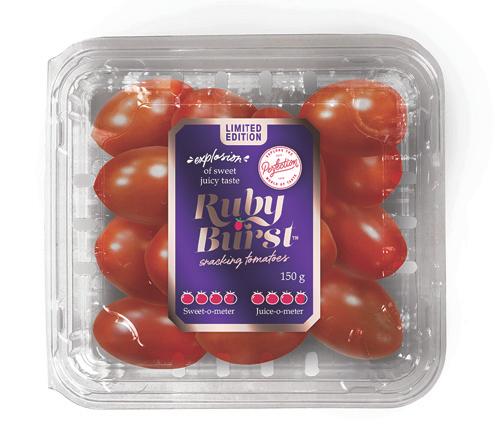
Chief marketing and innovation
officer Luke Gibson says Perfection
Fresh is among the first in the world to grow the new offering, which will be on Australian shelves until June 2023 as part of a limited release.
“Ruby Burst is an explosion of sweet juicy taste. Like no other tomato on the market, this premium tomato has a deep red appearance, firm but juicy texture and very high Brix, making it perfect for everyday snacking on its own, for entertaining platters or as the star of the show in salads and mains,” says Gibson.
“We’ve conducted sensory testing with consumers and 71 per cent of consumers rated it ‘better than other tomatoes on the market’. The new branding and name Ruby Burst encapsulate the premium product experience.”
clear grasp of the current state of the plant to avoid over-stressing it.”
MORE THAN TECHNOLOGY
WayBeyond chief technology officer Sean Tindale says creating successful agricultural products isn’t just about the technology.
“Successful horticultural technology is built from a comprehensive knowledge base for data modelling, alongside
TECHNOLOGY 36 fresh focus tomato
The New Zealand-based technology provider has developed an objective approach to managing plant production cycles.
p.36-37.indd 36 21/04/2023 10:26
additional information provided by the growers,” Tindal explains.


“We are incredibly fortunate to have six years of data collected from tomato producers and experienced partner growers around the world, that give validity to our solutions.
“As we continue to explore the use of artificial intelligence and build even more sophisticated models, tools like the Plant Balance Indicator will be just one of many options growers will have to optimise their production.”





FRESH INVESTMENT
WayBeyond’s bid to transform the controlled-environment agriculture (CEA) industry has been boosted by fresh investment from BASF Venture Capital (BVC).
BVC is the corporate venture capital company of BASF SE. It sees WayBeyond as a company driving the development of the CEA sector.

“The use of controlled-

OPPOSITE—The Plant Balance Indicator has been rolled out with tomato crops

environment agriculture to grow fruits and vegetables continues to expand globally,” says Markus Solibieda, managing director of BASF Venture Capital.
“As the next generation of growers enters the agriculture industry, we believe that their entry point will be CEA. WayBeyond is positioned to transform the way these CEA farmers grow the crops that will feed our growing population.”
Darryn Keiller, founder and chief executive of WayBeyond, says his company welcomes BVC’s investment.

“As a strategic VC fund, they are in a special position to appreciate WayBeyond as a disruptive business model,” says Keiller.
“We are perfectly aligned around the vision of a digitally empowered, sustainable agricultural industry. Together, we are focused on supporting farm operators and growers.
Harnessing digital growing is the future of CEA, and the way forward may not be so clear if you farm in greenhouses.
We will show you how to take your first important steps to achieve better crop outcomes and improve growing practices. Our digital agronomy solution delivers a clearer picture of your growing environment and plant health – so you can respond to daily challenges with certainty.
Way Beyond + + Improve production yield and quality with digital agronomy
LEFT—Darryn Keiller, founder and chief executive of WayBeyond
The
for
fresh produce
Learn more about taking your first steps in digital growing Visit www.waybeyond.io/eng p.36-37.indd 37 21/04/2023 10:26
integrated digital agronomy solution
protected
growers
Sofrupak focuses on plastic-free alternatives
The Polish packaging specialist aims to offer the most ecological packaging in Europe, using only renewable materials to ensure biodegradability.
by Tom Joyce @tomfruitnet
Since 2016, Poland-based Sofrupak has been creating eco-friendly cardboard packaging for fresh produce, focusing on effective cooling, ease of transport and functionality. The company says it was quick to anticipate the environmental trend and shift away from plastic and is well prepared to understand the needs of consumers.
As such, SoFruMiniPak packaging from the HandyPak EV+2 line is a new series of packaging with two lids and a fold-out handle. Only renewable raw materials are used to produce the packaging, which is 100 per cent biodegradable within 24 weeks.
“The idea behind the creation of this packaging was to find an alternative to plastic buckets with a handle (capacity 250-500g), in which cherry tomatoes or blueberries are packed,” the company revealed. “We managed to find such a solution, which resulted in the HandyPak EV+2 packaging. The advantage of this packaging is that it is plasticfree and available in sizes of 250g to 750g.”

Companies can apparently apply a personalised colour flexo or offset print to the packaging. “We provide our clients with a graphic service free of charge, helping them to prepare their individual project,” Sofrupak stated. “Particularly
noteworthy is the innovative and practical fold-out handle, thanks to which the customer does not need an additional bag to take fruit from the store.”
The packaging is easy to use, it said, closing quickly without the use of complicated and expensive machines, and offering excellent visibility and presentation of the fruit, as well as a competitive price.
“Thanks to the use of ecological materials, all the taste and nutritional values of the fruit are preserved,” the company added. “The packaging is certainly a racting the a ention of consumers and encouraging them to buy fruit.”
ABOVE—The company’s fully biodegradable packs with foldout handles
38 fresh focus tomato
PACKAGING
p.38.indd 38 21/04/2023 10:25
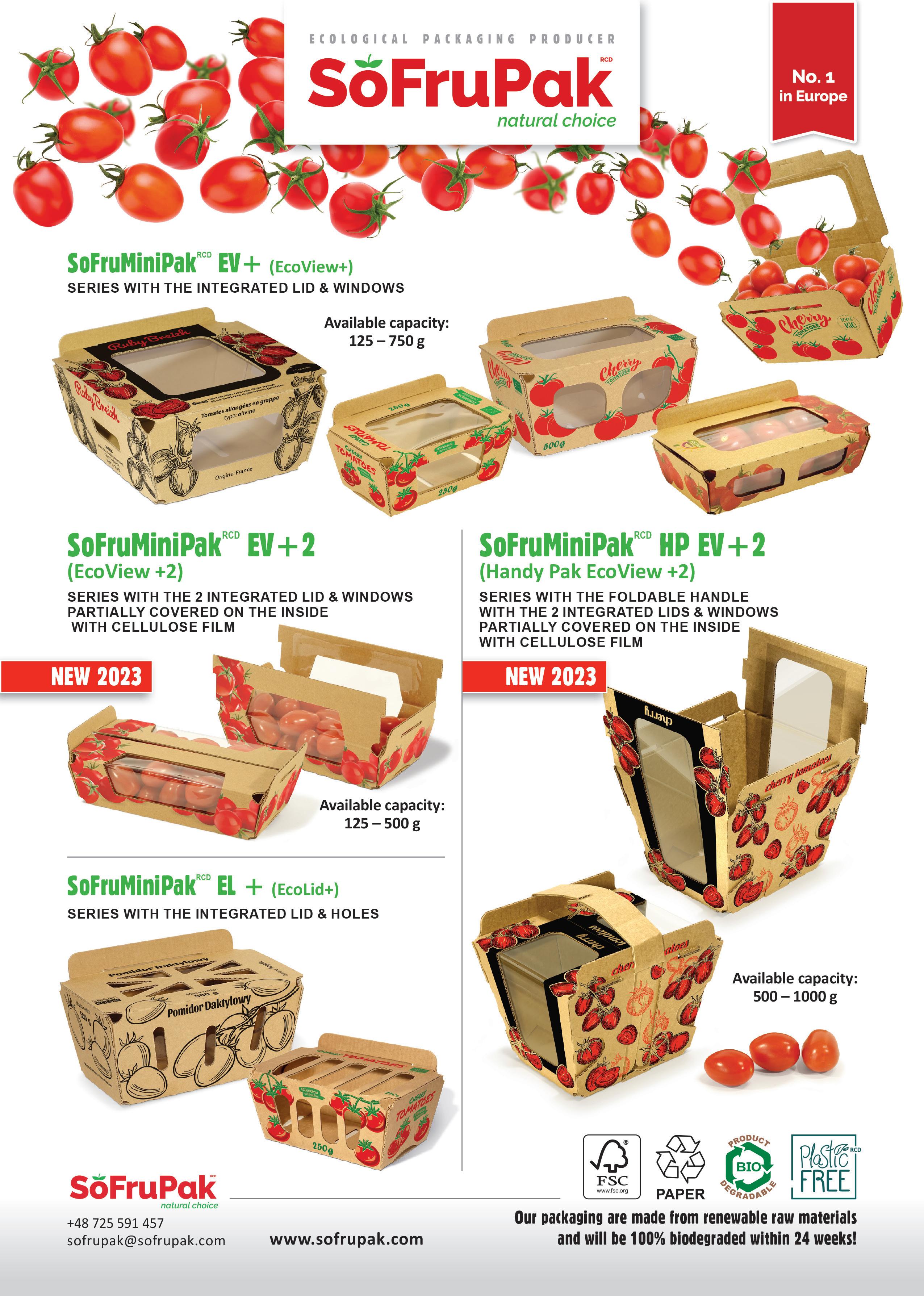
doc.indd 1 20/04/2023 10:07
Summer Swell represents ODB first
Tomato is the first to be grown using On-Demand Breeding, which speeds up the development of plant traits.
by Carl Collen @carlfruitnet
In the US, Sound Agriculture has announced the launch of the Summer Swell tomato, a new slicing variety with “superior taste and extended peak flavour”.

According to the group, Summer Swell is the first food to be grown using On-Demand Breeding (ODB), a non-GMO process that uses epigenetics to develop plant traits “ten-times faster than current methods”. For Summer Swell, this means increased durability and improved flavour, leading to reduced food waste and a more enjoyable eating experience.
Sound Agriculture pointed out that current agricultural practices favoured yield over taste, meaning produce could over-ripen on grocery store shelves before sale. Tomatoes from farmers’ markets o en tasted be er and fresher, but their shelf-life was limited, it noted.
“Summer Swell went from an idea to a new tomato within two years, representing a pace of innovation never before seen in plant breeding,” the company explained.
MORE FLAVOUR, BETTER SHELF-LIFE
Some of the benefits Summer Swell offers over existing slicing tomatoes include a new, more flavourful variety, reminiscent of an heirloom tomato; the ability to remain on the vine longer and develop more flavour and sweetness, while still being able to be er withstand transportation logistics; and the
new, innovative products that offer a great tasting experience,” said Stefanie Katzman, executive vicepresident at S Katzman Produce. “We were drawn to Summer Swell because of its proprietary platform, which is used to enhance flavour and shelf-life, two key factors that contribute to improved consumer experience and increased produce consumption.”
VARIETAL DEVELOPMENT
fact it retains peak flavour and firmness in the consumer’s home for eight days compared to three days for most heirloom tomatoes.
The group said that Summer
Sound Agriculture said that it was working with more than a dozen companies, including CPGs, ingredient and seed companies, to develop new varieties with improved nutritional content, reduced browning, increased pest resistance, improved texture, enhanced colour and more. These improvements address health and sustainability issues by improving nutrition, increasing access to healthy foods, and reducing food waste and chemical use.
Swell was rated as “be er tasting” than grocery store tomatoes by 81 per cent of consumer focus group participants.
The tomato is distributed through New York City-based produce wholesaler-distributor S Katzman Produce, and was first made available at grocery stores in the New York metropolitan area in April 2023.
“Our customers are looking for
“With On-Demand Breeding, consumers have access to great tasting plant-based options today without having to wait the five to ten years required by the traditional breeding process,” said Adam Litle, CEO of Sound Agriculture. “By tuning natural trait expression the Summer Swell tomato gives people access to delicious heirloom tomato flavour anytime of year.”
40 fresh focus tomato BREEDING
p.40.indd 40 21/04/2023 10:27
ABOVE—The Summer Swell tomato, developed using the OnDemand Breeding process




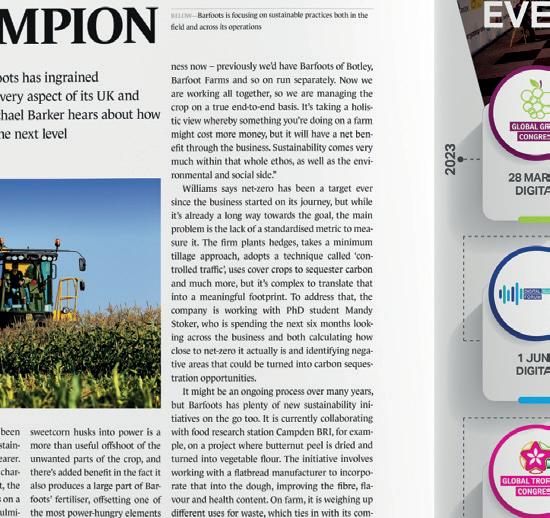




















































































































































































For information about how to subscribe, please contact: subscriptions@fruitnet.com | +44 20 7501 0311 All delivery costs included in your subscription. Digital Subscriptions includes access on 3 devices only. fruitnet.com/subscribe CHOOSE THE SUBSCRIPTION PACKAGE THAT’S RIGHT FOR YOU AND YOUR BUSINESS: SUBSCRIBE NOW! CORPORATE PRICES UPON REQUEST All the benefits of print & digital Bespoke packages available for your team or company Volume discounts for 3+ subscribers Personalised account management DIGITAL ONLY £100 PER YEAR 10 digital copies of Fresh Produce Journal plus all Fruitnet Specials Access to latest news and download content to read offline FPJ News: fresh news updates sent to your inbox PRINT & DIGITAL £125 PER YEAR 10 printed copies of Fresh Produce Journal plus Fruitnet Specials Digital edition: online access included FPJ News: fresh news updates sent to your inbox FPJ app is available for download, try it for free now! BRITAIN’S
FPJ2023 Subcard.indd 1 24/04/2023 10:00
FAVOURITE FRESH PRODUCE MAGAZINE SINCE 1895
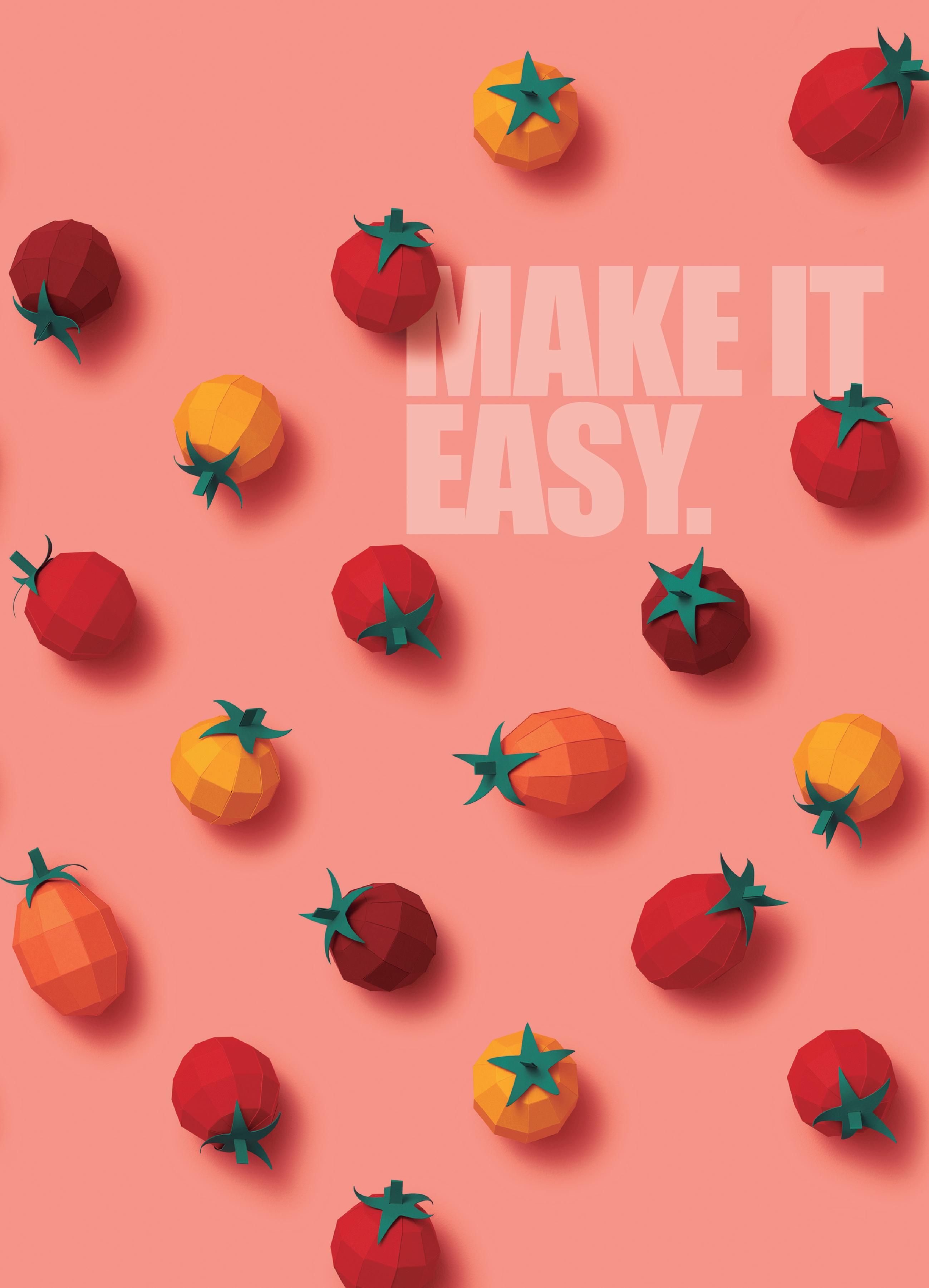
www.duroc.ma Sales@delassus.ma C M Y CM MY CY CMY K









































































































 by Carl Collen @carlfruitnet
by Carl Collen @carlfruitnet





















 by Fred Searle & Tom Joyce @fredfruitnet @tomfruitnet
by Fred Searle & Tom Joyce @fredfruitnet @tomfruitnet































 by Gerry Kelman
by Gerry Kelman





 by Carl Collen @carlfruitnet
by Carl Collen @carlfruitnet







































































